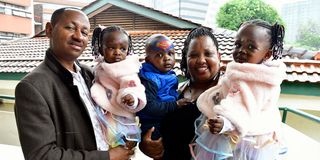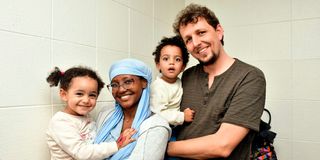
Martin Muchiri (left) holds his daughter Tianna Shugu with his wife Anne Martin holding their son Jayson Gitahi and daughter Tiffany Shiku during the Preemies and Mothers Day 2024 held at the Aga Khan University Hospital on November 16, 2024.
Of late, the number of preterm births is on the increase, with experts attributing this to several factors, including health complications, diet and changes in biodiversity.
Following the celebration of World Prematurity Day last week at the Aga Khan University Hospital, Nation Lifestyle spoke to parents of prematurely born children on the intricacies of their birth and care.
For Anne Martin, a mother of three preterm babies now all jumpy and bouncy, her pregnancy, delivery and post-delivery care was a rollercoaster of a journey.
“We got our babies at week 32, we had triplets, Jason, Tiffany and Tianna. Two of them stayed in hospital for three weeks. Tiffany was born weighing 1.5 kilogrammes; Jason was at 1.4 kilogrammes and Tianna was born at 840 grammes and had to stay in hospital for three months,” she says.

Martin Muchiri (left) holds his daughter Tianna Shugu with his wife Anne Martin holding their son Jayson Gitahi and daughter Tiffany Shiku during the Preemies and Mothers Day 2024 held at the Aga Khan University Hospital on November 16, 2024.
Tianna had a hole in her heart that was not closing and was required to do an open-heart surgery at that age.
At first, they were hesitant and decided to go for counselling.
“The baby was too young to go through such a procedure,” she says.
They were advised that if they didn’t go through with the surgery, they risked always having the child in hospital because of the condition. Luckily, the surgery went well.
Anne remembers having no milk for the first few days after her preterm birth.
“I could only express between five to 10 millilitres of milk at a time but this kept increasing gradually. The milk I expressed, however, was never enough for three babies so it was quite a challenge. The first three weeks of caring for the babies were relatively easier because we were still in the hospital and the nurses came in handy,” she says.
She was discharged a week after giving birth to the triplets but had to commute to and from the hospital to feed and kangaroo them.
“Because of the commuting, my Caesarean Section wound started leaking because I was not resting enough to give it time to heal. My husband on the other hand had to go back to work because his paternity leave had ended and we needed the money, and even then, he had to juggle between work and hospital. Sometimes we would be called at 3 am to take milk to Tianna in hospital and he would have to go and leave me with the two babies in the house,” she says.
She recalls her babies throwing up the milk she had laboured to express; how they would gain two grammes in one day and by the next day, she would find that they had lost a gramme or more.
Home visits
At home, they restricted visitors because the immunity of the babies was very low.
“Aside from our sisters who moved in to help with the baby, our home was pretty much cut off from visits and we officially had our first visitors after six months.”
Anne says she felt supported during that period, especially by her husband, who she thinks barely had enough time to sleep.
“My sisters, sisters-in-law and even the nurses put up a joint effort in caring for me and would check up even after I had left the hospital. The nurses were on call because we were always in continuous check-ups with the hospital which went on until the children reached two years old.”
As a mother of multiples, she recalls breastfeeding Jason first not knowing that he would suckle all the milk leaving nothing for the girls.
“When I realised this, I had to express first to ensure that every child had something to drink before leaving the rest for him,” she says, “I would feed them by the hour, then after every three hours because I had a feeding timetable to follow. It was also really hard to change the diapers too because they were so tiny.”
Is there one piece of advice she remembers that helped a lot?
“Many, but one nurse particularly helped when she advised me not to be fully covering them up to allow their immunity to adjust gradually to the environment,” Anne says.
She encourages parents with preemies to stay composed.
“It is usually a scare everyone because although as you can see the hands and all the visible body parts developed, there is always a fear of what you cannot see that hasn’t developed.”
Anne advises parents to always ask what they do not know or understand and most importantly, however hard it feels, to follow the instructions given by the doctors and nurses.
She encourages mothers especially, to learn how to avoid burnout.
“For me, it was hard to even go out and have a cup of coffee with my husband because I was worried about the babies. If you have good caregivers, it will help bring much-needed stability to your life. If you don’t balance, it could end up weighing down on you,” she adds.
Now that they are grown, does she treat them as delicate or special?
“You always have that feeling that because they are preemies you have to take more care of them, but they are all in good health and have never been back to hospital for any major issues. They are now as normal as every other child,” she says.
DJ at 28 weeks
For Jackson Mwosya and Ruby Atieno, the pregnancy journey of DJ, their preterm baby was arduous from the onset.
“DJ was born on November 19. He came at 28 weeks because I had preeclampsia which is increased blood pressure during pregnancy,” says Ruby.
“Two weeks before his preterm delivery, I had gone to the hospital because my blood pressure was high. I have always had an experience with chronic hypertension. My first child's pregnancy and delivery in 2016 was okay, but afterwards, when I went home, I started developing fainting spells and when I went to the hospital, I was told I had increased blood pressure. I was put on medication and after that, my pressure never went down.”

Jackson Kimeu Mwosya (right) with his wife Ruby Valentine Atieno with their child Djimon Kimeu Nyamai at the Aga Khan University Hospital on November 16, 2024 during the Preemies and Mother’s Day 2024.
When she got pregnant with DJ, she was still on high blood pressure medication and the doctors had to constantly change the drugs to regulate.
“In a day, I would spend Sh500 on the drugs and I took them for the entire duration of the pregnancy,” Ruby says.
Two weeks before delivering DJ, Ruby recalls her blood pressure getting too high.
“I was admitted to hospital at 9 pm as an emergency case. During the two weeks, the doctors were trying to lower my blood pressure to no avail. Eventually, they had to decide because if the blood pressure went higher, I would risk the life of the baby and mine too. I was told we’d both lose our lives or my brain, heart and kidney would be affected. An emergency C-Section was done and DJ came out weighing 1.2 kilos,” she recalls.
He was put in the neonatal ICU (NICU) on a ventilator for 19 hectic days.
“I sent home leaving the baby in the hospital. Unless you have the money to stay around, accommodation at the hospital can become expensive,” she says.
For Ruby, commuting was the most stressful. There were days she would come during the day to express milk and reach home late at night in Athi River, only to be called back by the hospital because the baby had developed complications or the baby needed blood and they needed consent forms signed to go ahead with the procedures.
Financial drain
Money was also a big burden.
“Our health insurance got maxed out. DJ was born and within the first 48 hours, there was an injection he was getting called Surfactant that was helping with his lung development and maturity costing Sh75,000 per dose and he was getting injections per day. Here you haven’t even factored in the ventilator, the neonatologist fee. Within the first day we spent more than Sh150,000,” she says.
Their insurer had a cap of Sh800,000 on preterm conditions.
“These are very low limits. The Sh800,000 was exhausted within the first week. A lot was involved, in DJ's care; brain scans were done to monitor internal bleeding. Abdominal scans were done to check his stomach because if they ended up giving him milk too soon, his gut would rot or his intestines could collapse. If he wasn’t passing stool or peeing, they would have to stop his feeding and review again,” she tells Lifestyle.
After 19 days, Ruby and her husband opted to move their premature baby to a cheaper hospital.
“It was hard work finding a neonatal centre. We drove to Kijabe and found out that their neonatal ICU (NICU) couldn’t take babies from outside because they were dealing with an infection outbreak in their wards. We later transferred him to Kenyatta University Referral Hospital in a specialised ambulance,” she says.
They stayed in Kenyatta University Referral Hospital for a further 21 days which they preferred because it had facilities for mothers too. Ruby recalls shedding tears every day because of the delicate nature of DJ’s condition.
“There was always a complication to be addressed each day. We were all in the negligible apprehensive business of monitoring gramme increments in weight,” she says with a laugh.
“On getting home, people were scared to come visit. We had restrictions although not so strict because I needed help. If I had put stringent restrictions I would have drowned,” Ruby says, “I was strict with hygiene in the house. My husband had to bathe every time he came back from outside, wear a clean shirt before carrying DJ, and my 8-year-old who was going to school always had to wear a mask on before carrying DJ.”
Jackson says he was not as lenient as his wife because any arising complication because of infections meant a jump in hospital bills and his insurance cover had maxed out within a month.
“I remember telling Ruby that I didn’t want to see any visitor in our home for three months after DJ had been discharged from hospital. Preterm babies take a toll on family life and relationships but if you are always in constant communication things will be easier,” he says.
Sh20,000 every month on clinic visits
Now that DJ is grown up, does he get treated as special or delicate.?
“Yes, he does,” Ruby says. “Even after he was through the hard part, he was required to see a chest, and stomach specialist and a paediatrician for a year. We also had to buy multivitamins and supplements which were not covered by the insurer so we had to dig into our pockets,” she says.
Any lessons for preemie mothers and fathers?
“If you have a support system it would lessen the stress. As husband and wife, try and support each other emotionally,” says Jackson, “financially you need to have a solid plan because it isn’t easy. My monthly budget was purely consumed by medical care with having to spend almost Sh20,000 every month on clinic visits and medicines.”
Jackson also suggests that if the husband can secure the funds and allow the wife to be at home and take care of the baby as they did, it would be good. Ruby adds, “Everyone will have a solution, do what you feel is best for your child. Do not be rigid, look for a second and third opinion. If you feel that something is not right, move.”
29 weeks
For Daki Galgalo and Tim Bunke, the pregnancy and birth of their preterm baby Malicha Thomas was no walk in the park either.
“Before Malicha came, I was given a total bedrest at 20 weeks and then he came on the 29th week. The whole period between 20 to 29 weeks was very stressful because of the uncertainty of his birth. I was celebrating every passing week that he wasn’t born because the longer he stayed, the better his chances of survival,” she says.
“At 29 weeks Malicha was born and taken to the neonatal ICU. The doctors did not sell us hope but took us through each day as it was. We stayed for a week at the neonatal ICU and then transferred to the High Dependency Unit where Malicha stayed for six weeks.”

Tim Bunke (right) holding his son Malicha Bunke with his wife Daki Galgalo holding her daughter Sophia Bunke pictured at the Aga Khan University Hospital on November 16, 2024 during the Preemies and Mother’s Day 2024.
She describes the milk-expressing part as the most depressing bit of her preterm baby journey because every day they needed more milk and she was getting put under pressure, not intentionally but the hospital needed more milk she didn’t have.
“I didn’t have milk for my baby and I was stressed about it, but the more you are stressed the less milk you produce. It was frustrating. It started with 5ml, then the nurses asked me for 10ml every two hours. This was very tasking. But I managed that he didn’t have to take any formula.”
There were days she could not pick up calls from the hospital because she expected to hear bad news. Her husband picked up the calls.
When they were discharged from the hospital, she was stressed to go home because she was worried about how to deal with the tiny baby.
“I was worried that he would forget to breathe because preemies forget to breathe and you have to pinch them to sort of like remind them. I was worried that Malachi would stop breathing when I was asleep,” Daki says. “But nothing happened, we are almost three years old now,” she says with a relieved sigh.
Another challenge that they faced was sleeping with the lights off.
“At NICU, Malicha was used to the light on and noise from the beeping machines. In HDU, you’d find about 10 babies and the place was also loud. When he came home, we’d put him in bed and turn off the lights and he would get really scared, and start crying because wasn’t used to darkness. The first few weeks he couldn’t sleep alone, he had to sleep either on my chest or my husband’s.”
Their advice to preterm parents?
“Try to express your milk. Try as much as possible to avoid formula milk. Even doctors will advise you this,” Tim says. Daki adds,“If you know someone you trust who is breastfeeding and you don’t have milk, you can talk to that person [milk donor or wet nurses]. I did it. The hospital will not approve of it but if you trust it…”
“For the dads, do the kangaroo for as many hours as possible. This is where you hold your naked baby to your bare skin on your chest, it helps you and a baby to connect, it makes them feel safe,” says Tim.
It takes a village
Dr Nikita Jethwa, a neonatologist working at the Aga Khan University Hospital says that preterm babies teach us some of the biggest lessons in resilience.
“They can conquer so many battles that even adults are not able to, sometimes you see some of them on the verge of giving up and even their doctors are almost giving up on them but somehow, they pull out of it,” he told Lifestyle.

Aga Khan University Hospital Consultant Neurologist Dr Nikita Jethwa poses for a picture during the Preemies and Mother’s Day 2024 on November 16, 2024.
What makes one vulnerable to getting a preterm baby?
“I think it is because of our environment, our diet and even biodiversity. Diseases like diabetes and hypertension in the younger generation play a part too. There is increased In-Vitro Fertilisation (IVF) happening which increases the chance of having a premature baby.”
Does preterm delivery happen often?
“Yes, it does, we are always having one or two per week in our hospital,” she says, adding, that premature delivery is a multidisciplinary team effort and does not just involve the neonatologists but also cuts across families and support staff.
“It takes a community effort to ensure the survival of a preterm baby.”








